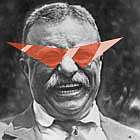Alelou wrote:blacknblue wrote:Nobody said it was a conspiracy. TNG just presents it as a desirable world. "From each according to his ability, to each according to his need."
I remember back when they first launched that series, and I think Rdodenberry explained that they wanted to show that money was irrelevant because there was no more scarcity -- every problem on earth had been solved by technology and the resources available in space, and the fear and insecurity that drives people to amass wealth had been eliminated. (Utopian, much?) Which was also why the starship looked like a freaking Marriott.
We can't relate to this at all today. We're back into energy crisis, climate crisis, expensive food crisis, jobs being sucked away to China and India, military prowess being questionable. We're all thinking scarcity at worst, conservation at best.
You know, it isn't only a question of wealth. Like I said in a previous post - even if the Federation is wealthy beyond the wildest dream of feverish greed you still need a medium of exchange simply for practicality. A society needs a common reference point for keeping track of the flow of goods and services. Money isn't all about greed, any more than food is all about gluttony, or clothing is all about vanity. Money serves a functional purpose in keeping a society moving along. But plainly the producers of Star Trek have never grasped this concept. At least not until DS9. The Ferengi indicate that at least some of the writers are not completely ignorant of the functional underpinning of how society actually operates, notwithstanding the overall utopianism of the larger Federation "dream".
Remember the episode where Jake wanted to buy a baseball card for his dad, but he couldn't because he had no money? So he went to his friend Nog for help? And Nog told him, "It isn't my fault that your people gave up money for some sort of philosophy of self-improvement."
There was another episode where the adult Alexander comes back from the future and sets the Enterprise on a wild goose chase after the two wicked Duras sisters. Riker uses a debt that Quark owes him for leverage to get some information. It turns out that he won a big pot at Quark's and Quark couldn't cover it, so he paid him off in credit at his bar. Riker objects that he could spend latinum anywhere, but credit at Quark's bar was only good at Quark's bar, and demands the information in payment instead.
Plainly somebody in that episode has at least a glimmer. Or was advised by someone who had a glimmer, about the function of a medium of exchange in the workings of social interaction.
"When the legends die, the dreams end. When the dreams end, there is no more greatness."
--Tecumseh
"It is better to be a live jackal than a dead lion."
--King Solomon the Wise
"The needs of the many outweigh the needs of the few." Unless the few are armed.


 .
.



